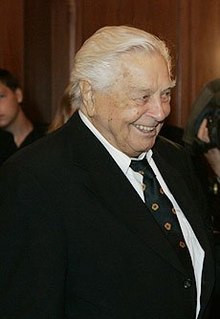Yuri Petrovich Lyubimov
|
Yuri Lyubimov PAR |
|
|---|---|

Lyubimov in 2007
|
|
| Born |
Yuri Petrovich Lyubimov 30 September 1917 Yaroslavl, Russian Republic |
| Died | 5 October 2014 (aged 97) Moscow, Russia |
| Cause of death | Heart failure |
| Occupation | Stage actor, theatre director |
| Years active | 1935–2014 |
| Spouse(s) | Katalin Lyubimova (1978-2014) |
| Awards |
|
| Website | http://www.lyubimov.info |
Yuri Petrovich Lyubimov (Russian: Ю́рий Петро́вич Люби́мов; 30 September [O.S. 17 September] 1917 – 5 October 2014) was a Soviet and Russian stage actor and director associated with the internationally renowned Taganka Theatre, which he founded in 1964. He was one of the leading names in the Russian theatre world.
Lyubimov was born in Yaroslavl in 1917. His grandfather was a kulak who fled to Moscow to escape arrest during the collectivisation. Lyubimov's father, Pyotr Zakharovich, was a merchant, who worked for a Scottish company, and his mother, Anna Alexandrovna, was a half-Russian and half-Gypsy schoolteacher. They moved to Moscow in 1922, where both were arrested. Lyubimov studied at the Institute for Energy in Moscow.
He was a member of Mikhail Chekhov's Second Moscow Art Theater from 1934 to 1936. During the 1930s, he also met Vsevolod Meyerhold, the avant-garde director. Lyubimov worked in the Song and Dance Ensemble of the NKVD, where he met and befriended Dmitri Shostakovich, Nikolai Erdman and many others.
After service in the Red Army during World War II, Lyubimov joined the Vakhtangov Theatre (founded by Yevgeny Vakhtangov). In 1953, he received the USSR State Prize. Lyubimov started teaching in 1963 and formed the Taganka Theatre the following year. His celebrated production of Bertold Brecht's The Good Person of Setzuan with Anna Orochko's class at the Schukin Theatre Institute earned him the artistic directorship of the Taganka Theatre. With Meyerhold, Stanislavsky, Vakhtangov and Brecht as his spiritual guides, Lyubimov eschewed Soviet drama for the more imaginative worlds of poetry and narrative fiction, which he dramatized, and the classics, which he broke apart, reconstituted and presented from a pronounced critical perspective. Under Lyubimov, the theatre rose to become the most popular in Moscow, with Vladimir Vysotsky and Alla Demidova as the leading actors. In 1971 Shakespeare's Hamlet became one of Lyubimov's highly successful and much acclaimed productions. In 1976 he was awarded by the BITEF First Prize for Hamlet.
...
Wikipedia
